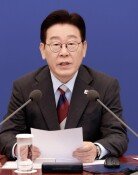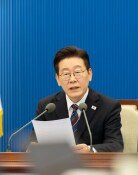Act for Free Economic Zone Offers Special Favors to Foreigners, Allege Domestic Entities
Act for Free Economic Zone Offers Special Favors to Foreigners, Allege Domestic Entities
Posted November. 10, 2002 22:44,
Enactment of the Act for Free Economic Zone is likely to encounter a heavy opposition from almost all the occupational groups in society. The labor unions, the green groups and the Korean Medical Association (KMA), for example, promise to employ all means to block the passage of the bill, which is scheduled for Nov. 14. They cite as the reason for their opposition the privileges to be provided to the economic zone, which, they assert, would probably abridge the fair competition.
On Nov. 8th, this legislation was originally put up for vote by the whole Congress, after passage through the congressional subcommittees in charge. Facing fierce oppositions, the vote was postponed.
On Sunday, according to the police, about 13,000 members of the Korean Confederation of Trade Unions held a rally on the University Ave. in Chongro Gu, Seoul, demanding that the government should scrap the bill since the bill allows unlimited exploitation of workers in the economic zone.
Herein, the major ideas in the bill are discussed in connection with fields of interest, along with the oppositions thereto, as follows:
△ Labor = The bill waives the application of the Labor Act to the foreign enterprises operating in the economic zone. Therefore, a foreign corporation in the zone does not have to pay for maternity leave, weekend and monthly paid leave. Moreover, unlike the domestic companies, the foreign counterparts have no obligations to make efforts to hire the veterans, the disabled or the elderly. On top of that, the foreign companies, under the bill, are bestowed a wide discretion in outsourcing jobs that should be conducted by specialists. Furthermore, the foreign entities are not prohibited from operating businesses classified for the small and medium-sized companies. Labor unions and women`s rights groups argue, "Implementation of the act will eliminate many paid holidays, cutting out in substance 18% of a man`s paycheck, and 20% from a woman`s." Citing these paycheck-reducing and women-discriminating reasons, the groups are pushing for scrapping of the bill.
In a meeting with Shin Heung in Switzerland, who leads the Korean Tripartite commission, the secretary general of the International Labor Organization reportedly told Shin, "The Act for Free Economic Zone of Korea poses serious threats to the rights of the workers in Korea."
△ Environment = Once a region is designated as an economic zone, development of a business, residential or industrial area does not necessitate getting a prior permission and/or approval from the government. Moreover, a developer is deemed to have obtained the permission or approval when the developer attempts to do 34 kinds of activities such as changing the usage of a land, developing a land as a farming field or lumbering.
The bill also expressly provides exclusion of the need for the environmental evaluation in developing a land, and gives numerous central or local tax benefits and credits to the foreign companies in the zone, including exemption of the income and corporate taxes.
The green groups contend, "The act, if enacted, will be the worst anti-environment legislation that could render the whole country barren. Designation of an economic zone is in discretion not of the President, but of Finance Minister. It`s not for the development, but for winning votes in the upcoming presidential election by giving favors to some districts."
△ Medical Industry = Under the bill, only foreigners can establish and operate medical institutions such as hospitals and pharmacies in the zone. In addition, no Korean citizen or corporation can run an educational entity of medicine. In response, the KMA has officially pronounced its opposition to the bill.
The KMA argues, "It`s against fair competition to allow only foreign individuals and corporations to run hospitals and pharmacies. Korean nationals should be guaranteed the same rights."
The bill does not allow any Korean national or business entity to run a hospital or pharmacy in the economic zone.
What Korean doctors and HMOs most sensitive is the provision allowing only foreigners to establish educational institutions of medicine. They fear it could lead to establishment of a foreign medical school in the zone.
If foreign medical schools are established, the doctors educated at that institutes are likely to practice in Korea, which, the KMA argues, runs a foul of the 2000 agreement between the KMA and the government to gradually cut down on the number of medical students.
Sang-Keun Song Jin Lee songmoon@donga.com leej@donga.com





![아침 공복 따뜻한 물 한 잔, 정말 살 빠지고 해독될까?[건강팩트체크]](https://dimg.donga.com/c/138/175/90/1/wps/NEWS/IMAGE/2026/03/05/133467930.3.jpg)

